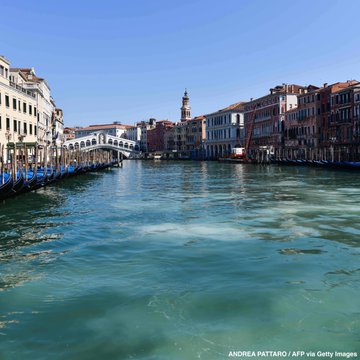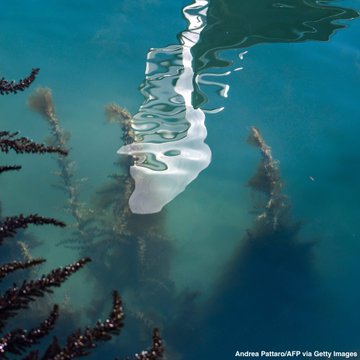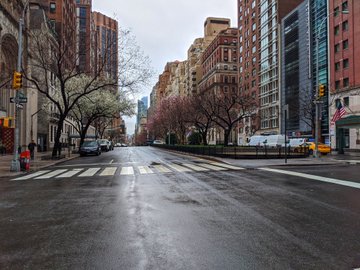The coronavirus pandemic has had an unexpected side effect in Venice—where the normally cloudy canals have transformed into water crystal clear enough to see fish swimming below. abcn.ws/2wa3cn3
Nitrogen dioxide is mainly produced by car engines, power plants, and other industrial processes, It is believed the be the cause for a myriad of health problems, especially respiratory illnesses like asthma. One of the largest drops in the gas has been seen in Wuhan, Central China. The city has been under strict lockdown since January.
Most of its 11 million inhabitants have been confined to their homes and industry, plus travel effectively came to a halt. This resulted in a 10-30% drop in emissions over the period.
2. The waters of Venice are clean once again
Another unexpected effect on the environment from the coronavirus has been seen in Venice, Italy. With tourists numbers culled because of the virus, the waters in Venice's canals are cleaner than they have been in living memory.
With things like motorboats effectively "grounded", sediment churning and other water pollutants have dropped dramatically. In most areas of Venice, residents have been amazed by how clear the water has become.
So much so, in fact, that fish can be seen once again in the canals.
3. New York's air has also gotten cleaner
Streets of New York are eerily empty. These were taken during the week on my way to work.
With many people around the world self-isolating voluntarily or by official edict, some major cities outside of China are also seeing their air quality improve. One example is New York.
Researchers have found that there has been a 5- to 10% drop in air pollutants like carbon dioxide in New York. Methane emissions have also dropped significantly.
Traffic levels are also significantly down, with some estimating in the region of 35%. Carbon monoxide emissions have also dropped by somewhere in the region of 50%.
“New York has had exceptionally high carbon monoxide numbers for the last year and a half,” said Columbia Professor Róisín Commane in an interview with the BBC. “And this is the cleanest I have ever seen it. It’s less than half of what we normally see in March.”
4. Air pollution is dropping as planes are getting grounded

Another interesting effect on the environment has been a significant reduction in air travel. In places like Europe, air traffic has taken a serious nosedive.
This is significantly improving air quality and reducing pollution in the skies above many countries of the world. With fewer planes buzzing around, issues associated with contrails and exhaust emissions are easing.
Somewhere in the region of 67 million fewer passengers flew in the first three months of 2020 to any year prior. Flight operators and policymakers are still trying to figure out how bad it will get over the next few months too.
Many airlines are canceling ever more of their flights. as the virus spreads around the world. For this reason, the IATA has predicted that the industry could be in for a loss of $113 billion this year as a result.
5. Emissions from coal combustion are falling in China

Yet another impact on the environment as a consequence of coronavirus is the marked drop in coal consumption. This has contributed, in no small part, to the drop in air pollutants in places like China.
Not only is this improving air quality in the regions affected, but it is reducing the number of airborne pollutants like carbon dioxide, carbon monoxide, and nitrous oxides.
China is, at present, one of the biggest producers and consumers of coal. It is estimated that they consumed around 59% of it for their energy needs in 2018. It helps runs much of its industry and is also used as a domestic fuel source for many of its citizens.
China's major coal-fired power stations saw a 36% drop in consumption between February and March this year, according to CREA analysis of WIND data.
6. Domestic energy use rising, commercial use is falling further reducing emissions

As more and more people are put under lock-down around the world, energy consumption profiles in buildings are being disrupted. With many people now working from home domestic energy consumption is predicted to have risen sharply.
It has been predicted that this has risen somewhere in the region of 6 to 8% in the U.S. alone. Conversely, with fewer people in commercial or educational buildings, their energy consumption should plummet by as much as a quarter to 30%.
This will ultimately save energy as the increase in domestic use is more than compensated by the larger drop in commercial and educational building uses. It also has the knock-on effect of reducing the consumption of polluting fuels in power stations as demand falls.
7. We can now meet our Paris Climate Accord goals sooner

And finally, some experts are claiming that countries may be able to meet their Paris Climate Accord goals because of the pandemic. As sectors like transportation and production come to a grinding halt, the associated emissions caused by them are also dropping as a consequence.
This could enable those affected countries to meet their 2015 Paris Climate Accord targets involuntarily.
"The coronavirus is driving us towards the emission reduction targeted by international climate agreements such as the Paris Agreement. So, the outbreak has forced us to reduce emissions that we cannot meet [with the targets] normally," said Huseyin Toros, of Istanbul Technical University.
He also noted the improvement in air quality in other heavily-populated cities like Istanbul, Turkey. Levels of airborne PM 2.5 (particulate matter) have dropped by 36% from early to late-March.









